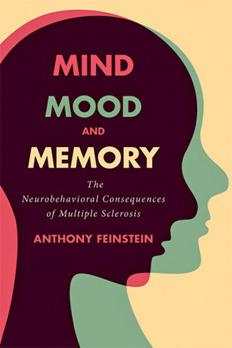Today, on World Mental Health Day, we are raising awareness of mental health challenges in people living with multiple sclerosis (MS) by highlighting a new book, Mind, Mood, and Memory: The Neurobehavioral Consequences of Multiple Sclerosis, written by Dr. Anthony Feinstein. Dr. Feinstein is a professor of neuropsychiatry at the University of Toronto. He is a leading expert in behavioural disorders in people with MS and has over 26 years of experience in the field.

Mood disorders and cognitive dysfunction are considered ‘invisible symptoms’ of MS that can disrupt daily living and impact employment and relationships. In his latest book, Mind, Mood, and Memory, Dr. Feinstein illustrates the challenges of cognitive dysfunction, and mood and behavioural disorders in people living with MS through case histories and the latest research.
Mood disorders, like depression, are common in people living with MS. An estimated one in two people with MS are expected to develop a major depressive illness over their lifetime. Major depression is defined as five or more depressive symptoms (e.g., inability to enjoy life, changes in sleep or appetite, fatigue, low energy, negative thoughts, and apathy) over a period of two or more weeks. For more information on depression and MS – read here.
Cognitive dysfunction can affect people living with MS and its prevalence differs by disease course. It affects 45% of people with relapsing-remitting MS and may increase to approximately 80% in secondary progressive MS and 90% in primary progressive MS. Cognitive dysfunction can affect various functions we take for granted such as information processing, planning and problem-solving, decision-making, and learning and memory. In this book, Dr. Feinstein provides a detailed description of the tools used to assess cognitive functions, therapeutic interventions for treatment, and innovative approaches that are being developed to enhance cognition in people living with MS (for an example, read more about the clinical trial, CogEx, supported by the MS Society of Canada).
Overall, this book is a helpful, accessible, and comprehensive resource on cognitive dysfunction and mood and behavioural disorders in MS for use by health professionals, people living with MS and their caregivers. If you live with MS and are facing challenges with your mental health, please contact your health care team to discuss your symptoms. For additional support, you can reach out to the MS Knowledge Network to speak with an MS Navigator who can help direct you to resources for support. MS Navigators can be contacted at 1-844-859-6789 or by email via msnavigators@mscanada.ca. The MS Knowledge Network is not a distress centre nor a crisis organization. If you are in immediate need of support, call 9-1-1 or go to your nearest hospital.
Support and mental health resources:
- Crisis Services Canada – If you’re thinking about suicide, or are worried about a friend or loved one, the Canada Suicide Prevention Service is available 24/7 for voice and 4pm to 12am ET for text.
- Wellness Together Canada - Online tools and resources to help Canadians with a variety of mental health challenges.
- BounceBack® - Telephone and online-based skill-building program offered through the Canadian Mental Health Association (CMHA)
- Centre for Addiction and Mental Health
- Resiliency: Addressing the challenges of MS (watch the video on YouTube)
- Canadian Psychological Association
More information:
- Click here to listen to Dr. Anthony Feinstein discuss his book on how mind, mood, and memory impact MS on the Real Talk MS podcast (episode 236, timestamp 12:31).
- Learn more about “Multiple Sclerosis and Depression” in a blog published on October 10, 2021 - here
- Dr. Feinstein currently leads a large clinical trial (CogEx) across six countries and 11 sites to evaluate the effect of aerobic exercise and cognitive rehabilitation on cognition in people with progressive MS. For more information on the CogEx clinical trial supported by the MS Society of Canada – see here.
References:
Feinstein, Anthony. Mind, Mood, and Memory: The Neurobehavioral Consequences of Multiple Sclerosis. Baltimore: Johns Hopkins University Press, 2022.